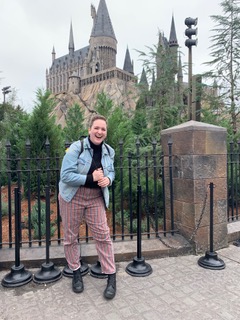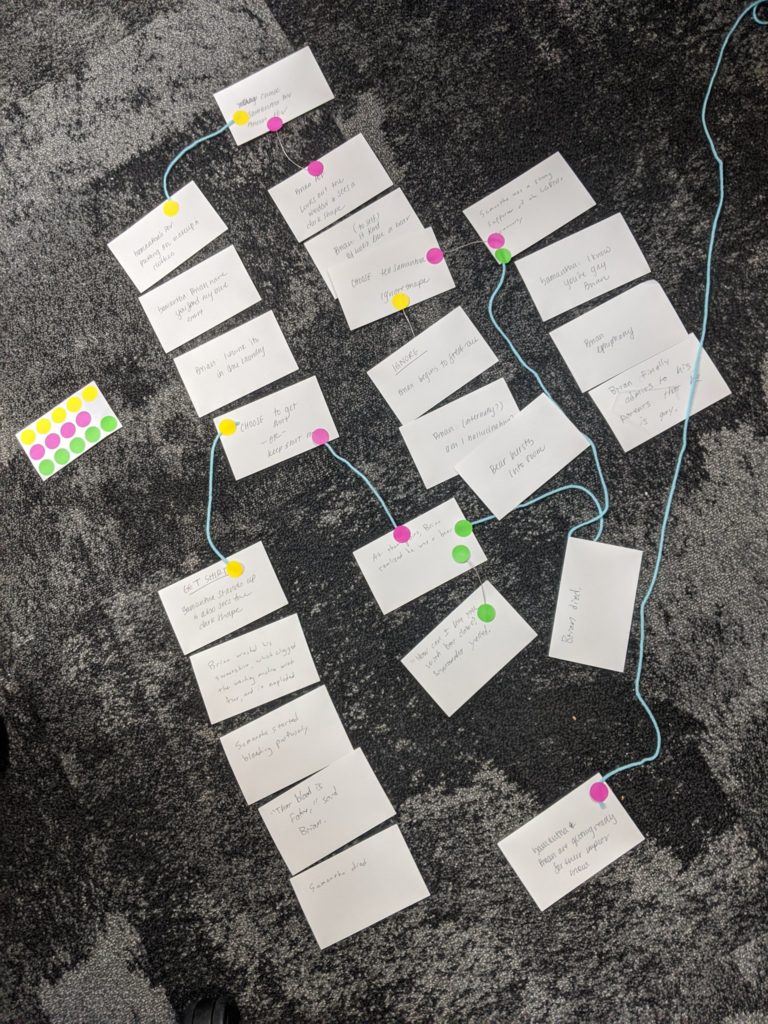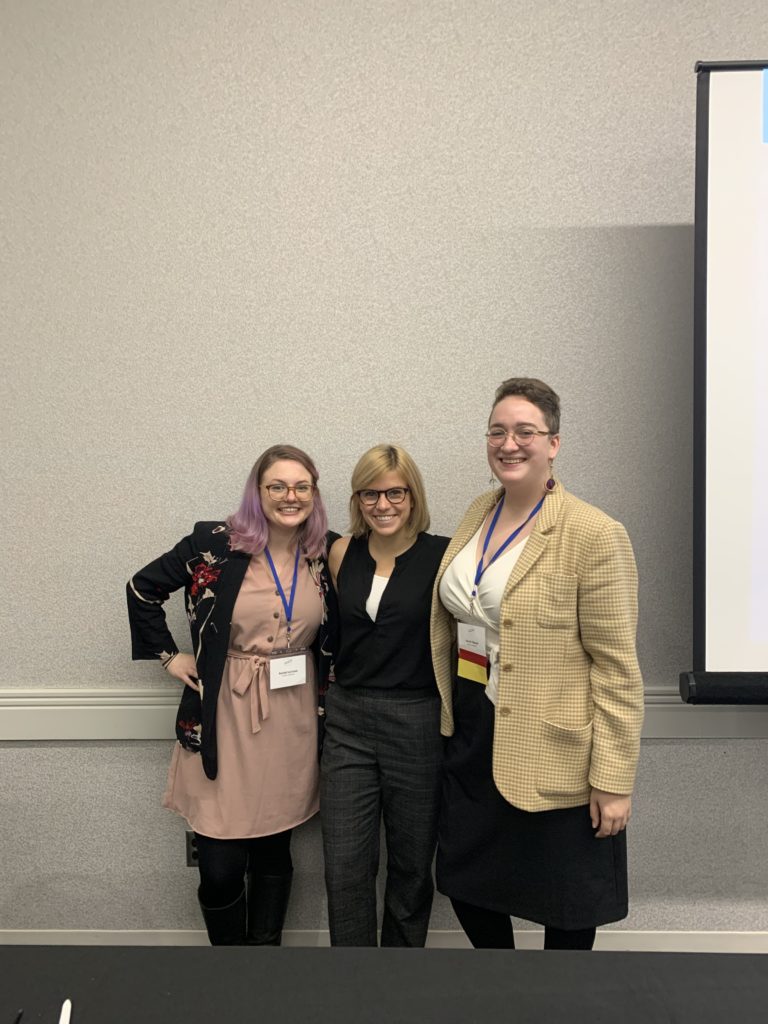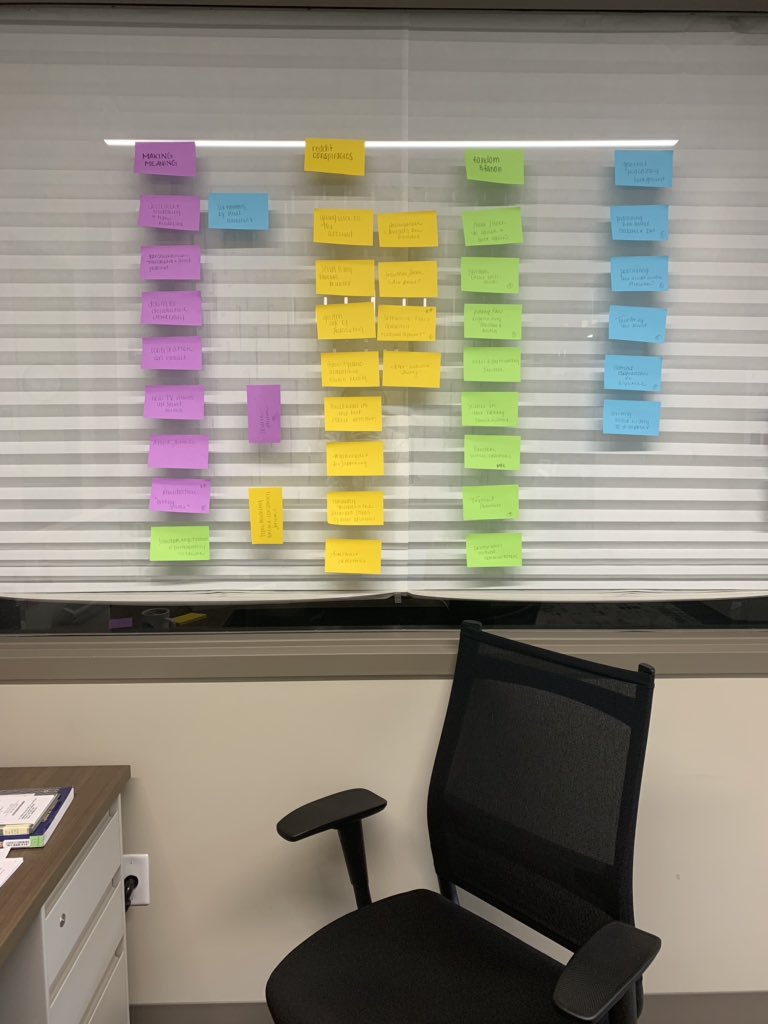Lauren R. is a 2019 graduate of the MA in English program at DePaul. She worked at the UCWbL from 2018 – 2019 as a graduate assistant, writing fellow, and writing groups leader. Lauren enjoys playing DnD, writing, and tending to her plants in her free time.

Current Career and Education
Where are you now? Where do you work?
“I’m currently a doctoral student at the University of Central Florida in Orlando, Florida. I’m in the Texts and Technology program there, which focuses on an interdisciplinary approach to the humanities by combining fields like writing, rhetoric, philosophy, technical communciation, and public history with digital methods and practices in coding, game design, and archiving. My research looks at fandom and the rhetoric and discourse that fans use when discussing / describing cognitive and emotional disabilities in their fanart and fanfiction.”
Do you enjoy your job or your current work?
“I feel like this is a very loaded question, haha! Do I enjoy graduate school: does anyone?”
“I love what I am researching; it’s really a great feeling to be able to study what you want for your livelihood. My research deals with online technology, and I get to better understand people through the social networking sites that they use and the conversations that they have on these platforms. Also, there’s a lot of incredible work being done in my fields: things like critical code studies (see Mark C. Marino’s Critical Code Studies), algorithmic studies (see Safiya Noble’s Algorithms of Oppression), and disability studies/crip theory (see Sami Schalk’s Bodyminds Reimagined).”“Fan studies is making moves into critical race studies, as well as disability studies, and it’s great to be researching important topics that affect so many people who have been left out of scholarly conversations for so long. I also get to learn about really interesting forms of textual analysis in my program, like sentiment analysis or topic modeling; I’ve developed a lot of web-development skills, like making twitter bots or creating a website with HTML 5 and CSS; and my program focuses on teaching us tools like Github repositories, Python, or JavaScript, all of which can make us more competitive in academic or alt-ac careers.”
“However, a PhD is a lot of work, which makes it not so fun sometimes. Doctoral programs expect a lot out of you (published articles or book chapters, as well as attendance at conferences), and academic twitter can be pretty sad—but I’m working on not letting the tedious/not-so-fun stuff bog me down and thinking positively about their outcomes. A conference allows for me to research something new and meet new people; a journal article allows for me to argue my research to a large group of people.”
What are your goals after you receive your PhD?
“I want to get a post-doctorate while I look for tenure track jobs. My program is really great at setting us up for many different jobs, both in and out of academia. Also, a lot of schools around the globe are setting up Digital Humanities centers and programs, and the opportunity to help with one of those right after I get out of graduation is something that’s extremely interesting to me.”
What were some big challenges to adjusting to life post-graduation?
“I want to get a post-doctorate while I look for tenure track jobs. My program is really great at setting us up for many different jobs, both in and out of academia. Also, a lot of schools around the globe are setting up Digital Humanities centers and programs, and the opportunity to help with one of those right after I get out of graduation is something that’s extremely interesting to me.”
What are your plans for the future? What is your main goal right now?
“Plans for the future…having every surface in my apartment covered with plants?”
“Graduate school constantly asks you to have a plan for the future—but it’s often a lot of catrophising and not so much actual planning. Right now, my main goal is getting an article accepted for publishing by the end of this spring, which is definitely achievable as I already have a few things out in the ether. I’d love to write a book at some point in the future, but other than that, I’m trying to take my program one step (okay, more like several steps) at a time.”

UCWbL Retrospective
How has your writing process changed since you joined the UCWbL?
“When I was at the UCWbL, I advocated for new ways to discuss writing with writers that were accessible (could be used in appointments for writers with cognitive/physical disabilities or neurodiverse writers). I tried to employ a variety of techniques in my own tutoring sessions: we (the writer and I) worked with physical space and materials to draft an essay, used graphic organizers for editing, and visualized the structure of the essay when writing.”
“This past fall, I was able to share my techniques as well as others with Rachel L. and Hannah T. at IWCA 2019. Now, I use these techniques in my own writing, as they help me think about longer projects a lot better—one that is particularly useful is writing down articles for a lit review on individual post-it notes and physically moving them around on a wall to group them into themes for a literature review. These visual techniques reinforce the UCWbL core belief of: ‘There is no universal writing process that all writers (should) use.”


What is your best memory at the UCWbL?
“I really enjoyed taking the tutoring class with director Matthew Pearson last fall. It was a good time to talk through issues that we had in our own tutoring, as well as issues that affect writing centers at large. It also gave me a great group of friends (Nicole H., Hannah T., Sam M., ’19, and Rachel L.), who acted as an incredible support system for me while I was at the UCWbL. Nicole and I also formed our own little writing group and send each other things that we’ve been working on for our own classes (she hand-edited my thesis at the end of last year and has helped me with journal articles this year; I’ve been giving her feedback on PhD applications and will probably help line-edit her thesis this spring).”
What skills developed at the UCWbL help you with your current work?
“The UCWbL has really helped me with ways to respond to student writing. As I transition into teaching courses next year in my doctoral program, I’m really glad for the lessons that I received from CMWR and writing groups. Nicole H. and CMWR’s previous coordinator, Mark Lazio, have done a great job providing incredible resources (the CMWR tutor guide) and trainings for the staff about how to work with multilingual writers, which will benefit me as I worked with a large Latinx and multilingual population down at UCF.”
“The UCWbL also taught me a lot about advocating for myself and my needs, as well as creating boundaries with writers, which will be beneficial in the college classroom.”
What advice would you give to current UCWbLers, whether it be about writing, post-grad, or life in general?
“Current UCWbLers: don’t be afraid to try something new. The easy way is to have your writers do the same activities every appointment—but developing your own writer’s toolkit can give you a lot of great ways to help your writers better their writing, as well as your own.”
“Life in general: Actually practicing self-care (and not just saying you will) is vitally important. Our society makes it really hard for you to accept that taking breaks or doing pleasurable things is a good and normal thing, but as I found out last semester, grad school will eat you alive if you don’t take a break. Taking a break is not the end of the world. Find something that you can focus your energy on that makes you happy (for me, it’s house plants, a D&D campaign, and learning how to make sourdough bread). It can make all the difference when you’re stressed out.”
“Post-grad: If you decide to go the graduate school route, the most important thing I will say is not paying for it yourself. Finding a fellowship or a graduate assistantship with your program can make all the difference. There are tons of funding opportunities out there that align with your research and many opportunities will fund you for several years.”
Lauren R. is one of many wonderful UCWbL alumni. If you know of any others who would be interested in an interview, please do not hesitate to contact Robert R. on slack.
